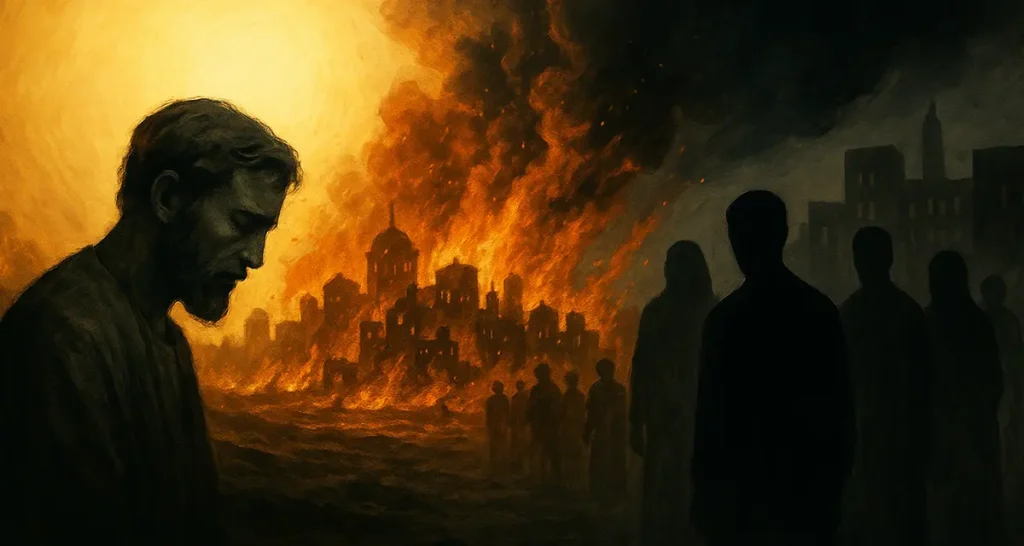This is a vital and sobering question — and the parallel between Sodom’s fall and Isaiah’s warning is direct, piercing, and prophetic. Let’s explore it in two parts:
📜 1. Isaiah 5:20 – “Woe to those who call evil good and good evil…”
“Woe to those who call evil good and good evil,
who put darkness for light and light for darkness,
who put bitter for sweet and sweet for bitter.”
— Isaiah 5:20
This verse is part of a series of six woes Isaiah pronounces upon the people of Judah (Isaiah 5:8–23), denouncing moral, social, and spiritual decay.
The sin here is not simply doing evil — but redefining it. It’s the inversion of the moral order, the dismantling of discernment, and justifying darkness in the name of progress, freedom, or virtue.
It’s what Sodom did.
It’s what Judah was doing.
And it’s what modern societies are increasingly tempted to do.
🔁 2. The Parallel with Sodom
Sodom’s Inversion:
- Violence was treated as entertainment or a right.
- Hospitality was rejected in favor of abuse.
- Warning was mocked. “Who made you our judge?” (Gen. 19:9)
- Righteousness was a threat to their autonomy.
They weren’t merely sinning — they were redefining sin. That’s why the judgment was so severe and final.
Isaiah’s Jerusalem was no better:
- The poor were oppressed.
- Justice was bought and sold (Isaiah 5:23).
- Drunkenness and arrogance marked the leadership.
- And all the while, people still claimed to serve God.
Again, not just sin — but systemic self-deception, cloaking evil in the language of virtue.
⚠️ 3. The Warning for Our Modern Society
We live in a world where:
- Killing the unborn is called “choice.”
- Sexual confusion is called “authenticity.”
- Greed and exploitation are called “success.”
- Mocking truth and faith is seen as “courage.”
- Conviction is shamed as intolerance, while sin is celebrated as liberation.
This is not merely moral failure — it is moral inversion. When a society loses its ability to blush (see Jeremiah 6:15), it enters dangerous territory.
Like Sodom, such a society:
- Scorns warnings,
- Persecutes prophets,
- Dismisses judgment as superstition,
- And praises what God condemns.
🌅 4. God’s Response: Patience… Then Justice
The Lord is patient — extraordinarily so — but His patience is not approval.
Sodom’s judgment came suddenly, finally, and without remedy.
“…until there was no remedy.” — 2 Chronicles 36:16
Jesus warned that the last days will be like the days of Noah and the days of Lot (Luke 17:26–30). Not because people will be obviously evil, but because they’ll be living as if nothing is wrong — right up until the judgment falls.
✝️ 5. The Call to the Church Today
For believers, this is not a call to rage at the culture, but to:
- Stay faithful when truth is mocked.
- Speak boldly with compassion, like Lot should have.
- Live purely in a crooked generation.
- Intercede like Abraham did — praying for mercy and redemption.
- Warn humbly — not from a pedestal, but as rescued sinners.
The call is to shine, not to blend in.
“Do not be conformed to this world, but be transformed…” (Romans 12:2)
“You are the light of the world… let your light shine before others.” (Matthew 5:14–16)
🙏 Final Thought
Calling evil good doesn’t change evil — but it changes us, numbing our conscience, darkening our understanding, and distancing us from God.
The warning is real — but so is the hope. For even in Sodom’s ashes, God rescued a family. And today, grace still reaches those who listen.


